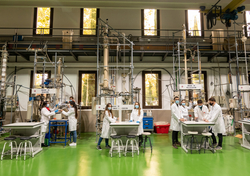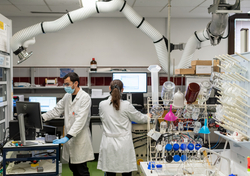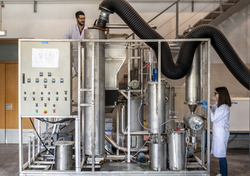
Wroclaw University of Science and Technology, as the first university in Poland ever, coordinates the EU Erasmus Joint Master Degree programme (EMJM). The “Sustainable Bioproducts and Bioprocess Engineering” (SBBE) programme is coordinated by Prof. Jolanta Warchoł from the Faculty of Chemistry. The project budget is 4,3 mln EUR.
The EMJM-SBBE is the 2 years (4 semesters) program in the field of chemical engineering. It corresponds to 120 ECTS credits. Each recruited student (18-22 people/year) will be getting a scholarship (1400 EUR/month) for the whole period of studies. 75% of selected students should come form outside the EU countries.
The program is realized at 3 Full Higher Education Institution Partners from 3 European Union countries: Wroclaw University of Science and Technology (Poland), University of Castilla-La Mancha (Spain), Lappeenranta-Lahti University of Technology (Finland).
Mobility Scheme:

The education plan directly responds to the current labour market needs. SBBE graduates are prepared to design, develop and implement process’ technologies and solutions for the sustainable utilization of renewable resources. They also learn how to manufacture biobased products, including biofuels, bioenergy, biochemicals, bioplastics, paper, building materials, biocomposites, and about their applications. The new EMJM program relates to:
FORMAL EDUCATION covers scheduled lectures and seminars - theoretical knowledge transfer. However, the greatest emphasis is put on practical process design and laboratory classes. We focus on knowledge, skills and attitudes building on chemistry of materials, biomaterials fabrication and characterization; fundamentals, design and optimization of bioprocesses; climate change and sustainable development. Special attention is paid to rural development – sustainable farming; management of natural resources, soil protection; bio-agriculture; sustainable transport modes; developing sectorial strategies and methodologies – how to save resources, reduce energy use and waste.
INFORMAL EDUCATION covers activities organized with the local communities (any of academic, cultural and social) such as study visits at one of the Associate Partner - Roztoczański National Park. This will allow students to familiarize with non-specialists opinion about green energy production, biomass and wastewater utilization in a frame of circular economy, sustainable natural water use. We also envisage building the sense of belonging by organizing additional joint social and culture activities such as: trips to important historic, cultural and regional/local environmental spots; joint sport activities (e.g. mountain hiking); social events (e.g. international events held in the host city). A visit to Verla mill museum (Kouvola, Finland), a UNESCO World Heritage site, introduces the history and early pulping technology. We envisage meetings with ecologists and engineers from industry to allow students be updated with the current environmental friendly technologies.
NON-FORMAL EDUCATION provides additional educational activities beyond the main study program: Polish, Spanish, or Finnish language classes, workshops, summer schools, participation in additional scientific events taking place at the partner universities e.g. open scientific days, students’ conferences, invited lectures with famous scientists.
The teaching program of the Joint SBBE Master Program leads to the award of a joint degree. All partner university’s authorities will sign the Joint Master Degree Diploma certificate with the common diploma supplement.
The first academic year will start in September 2022. The first students intake will be announced in March 2022. The full program and recruiting information will be provided on the dedicated website (under preparation) as well as on the EU website Euraxess.


